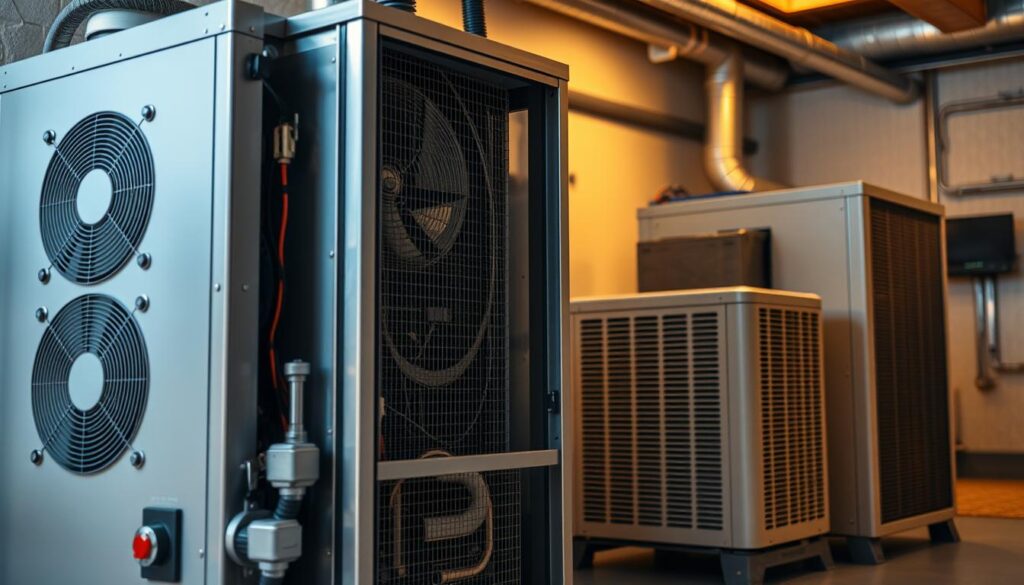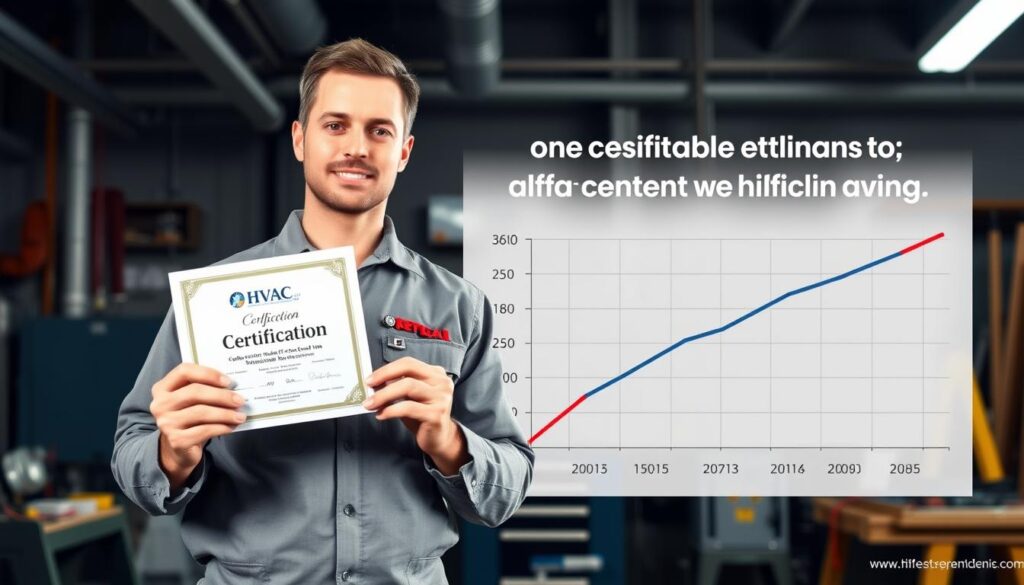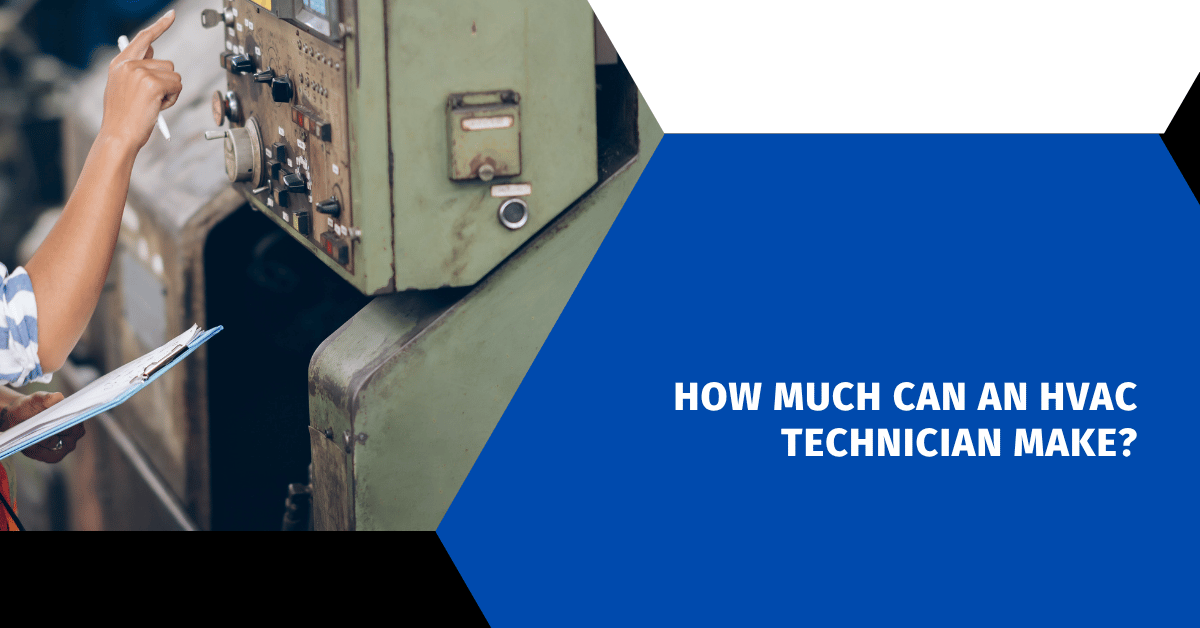Affiliate Disclosure
HVAC Guide Guys is a participant in the Amazon Services LLC Associates Program, an affiliate advertising program designed to provide a means for sites to earn advertising fees by advertising and linking to Amazon.
How Much Can an HVAC Technician Make? Are you thinking about a career that’s both rewarding and in-demand? The HVAC industry is booming, with great opportunities for those who are willing to learn and grow. Starting salaries for HVAC technicians are expected to reach $54,100 by 2025, making it a promising field for career earnings.

HVAC technicians are essential for keeping buildings comfortable. They work in homes, offices, and factories. Their skills lead to stable jobs and good pay in a field that’s always changing.
The need for skilled HVAC workers is on the rise. This means there are many chances for career growth and making money. If you’re looking to start or advance in this field, knowing about salaries is key.
Key Takeaways
- Entry-level HVAC technicians can expect competitive starting salaries
- Career progression offers significant income growth
- Specialized skills can dramatically increase earning
- Geographic location impacts HVAC technician compensation
- Certifications and continuous learning boost marketability
Table of Contents
National Average HVAC Technician Salary Overview
Understanding the hvac job income is key for those thinking about HVAC careers. Salaries vary by experience, location, and specialty. Let’s look at how salaries change at different career stages.
Starting your HVAC career is exciting, with good pay for beginners. Those with 0-2 years of experience have a strong base for their earnings.
Entry-Level Salaries
For new HVAC starters, the first salary range is encouraging:
- Median starting salary: $54,100 annually
- Typical range for beginners: $45,000 – $60,000
- Opportunities for quick skill growth
Mid-Career Earnings
With more experience and skills, your income increases. Technicians with 2-4 years see a big pay jump:
- Median mid-career salary: $65,700 annually
- More job duties
- Chances for specialization
Senior-Level Compensation
Experienced HVAC pros with 4-7 years earn well. Senior technicians use their deep knowledge:
- Median senior-level salary: $77,200 annually
- Advanced technical skills
- Leadership opportunities
Your earnings in HVAC keep growing as you improve your skills and gain experience.
Explore Our HVAC Shop
Looking for top-rated HVAC tools, parts, and accessories? Visit our shop and find the perfect solution for your needs.
Visit the ShopHow Much Can an HVAC Technician Make?
Exploring how much an HVAC technician can make shows promising career paths. The HVAC field offers good pay for those who grow their skills. With 40,100 new HVAC jobs expected by 2033, your earnings can grow a lot.
Your earnings as an HVAC technician depend on a few things:
- Where you live
- Your special skills
- How long you’ve been working
- Any extra certifications
New technicians start with good pay. Experienced ones can earn even more. Skills in commercial HVAC or new tech can raise your pay.
Smart career choices can boost your earnings. Here are ways to increase your income:
- Get advanced technical certifications
- Learn about new HVAC tech
- Look into supervisory or management jobs
- Think about starting your own HVAC business
The HVAC industry is more than a job. It’s a chance for a stable, well-paying career.
Keep improving your skills and know the latest trends. This way, you can reach high earnings in HVAC.
Top-Paying States for HVAC Technicians
Your salary as an HVAC technician can change a lot based on where you work. Some places pay HVAC pros a lot more, making it worth moving to get a better job.
Where you live affects how much you earn as an HVAC tech. Things like how much people need your services, the cost of living, and the local economy all play a part.
California: Leading the Pack
California is the best place for HVAC techs to make money. They earn an average of $59,200 a year. The demand for heating and cooling in California’s varied climates means techs get paid well.
New Jersey: Northeast Powerhouse
New Jersey is close behind, with HVAC techs making about $58,300 on average. The state’s crowded areas and old buildings mean there’s always work for skilled techs.
Washington: Pacific Northwest Opportunity
Washington is the third highest paying state, with HVAC techs earning $58,000. The state’s strong tech and manufacturing industries mean there’s a lot of demand for HVAC skills.
| State | Average Annual Salary | Key Economic Factors |
|---|---|---|
| California | $59,200 | Diverse climate, tech innovation |
| New Jersey | $58,300 | High population density, infrastructure needs |
| Washington | $58,000 | Technology sector growth |
Thinking about your HVAC career? These top states offer great chances for growth and making more money.
Explore Our HVAC Shop
Looking for top-rated HVAC tools, parts, and accessories? Visit our shop and find the perfect solution for your needs.
Visit the ShopFactors Affecting HVAC Technician Salaries
Knowing what affects hvac trade income can help you earn more in the HVAC field. Your salary isn’t just about your basic pay. Many factors play a role in your total earnings.
Several key factors impact your hvac career earnings:
- Experience Level: More years in the field mean higher earnings
- Specialization: Skills in specific HVAC systems can increase your value
- Geographical Location: Salaries vary a lot by state and region
- Certification Status: Having certifications can lead to higher pay
Your work setting greatly affects your income. Commercial HVAC techs usually make more than those working on homes. Skills like refrigeration or solar HVAC can also raise your earnings.
There are more ways to earn extra:
- Overtime work
- Emergency repair services
- On-call weekend and night shifts
- Performance-based bonuses
Being in a union can offer better pay and benefits. By focusing on your skills and understanding these factors, you can make a more profitable career in HVAC.
Experience Levels and Salary Progression
Your earnings in the HVAC field can really grow as you gain more experience. Knowing how your salary will increase helps you plan for your future. It’s key for both your financial and professional growth.
HVAC wages change a lot based on your career stage. Technicians see big pay increases as they move from entry-level to more specialized roles.
Apprentice to Journey-Level Transition
At the start of your HVAC career, you’ll be an apprentice. Your pay will be lower, but you’ll learn a lot of important skills and knowledge.
- Apprentice average starting wage: $15-$20 per hour
- Typical apprenticeship duration: 3-5 years
- Learning core technical skills and safety protocols
Senior Technician Earnings
As you get better at your job, your pay will go up a lot. Senior technicians with 5-10 years of experience can earn a lot more.
| Experience Level | Annual Salary Range |
|---|---|
| Entry-Level Technician | $35,000 – $45,000 |
| Mid-Career Technician | $50,000 – $65,000 |
| Senior Technician | $65,000 – $80,000 |
Supervisor Level Income
Getting to a supervisory role can really boost your earnings. Experienced pros with leadership skills can make a lot in management.
- Supervisor average salary: $70,000 – $90,000
- Potential for additional bonuses and benefits
- Requires strong technical and management skills
Investing in continuous learning and skill development can accelerate your career progression and income in the HVAC industry.
Commercial vs Residential HVAC Income Differences

Exploring hvac job income shows a big difference between commercial and residential work. Commercial HVAC technicians make more money because of the bigger and more complex projects they handle.
The income for commercial HVAC contractors changes a lot based on several things:
- System complexity and size
- Technical skill requirements
- Project duration and complexity
- Specialized certification levels
Commercial HVAC work needs advanced technical skills. You’ll need special training for the big, complex systems in places like offices, hospitals, and factories. This skill means you can earn more.
Residential HVAC technicians work on smaller systems in homes and apartments. Their jobs are shorter and simpler, leading to lower earnings. Commercial technicians, on the other hand, can earn:
- 20-40% higher base salary
- More consistent work opportunities
- Potential for long-term contracts
Your career path greatly affects your income. To earn more in commercial HVAC, you need extra certifications and training. But the money you can make is worth it.
Pro tip: Consider pursuing advanced commercial HVAC certifications to maximize your earning.
Explore Our HVAC Shop
Looking for top-rated HVAC tools, parts, and accessories? Visit our shop and find the perfect solution for your needs.
Visit the ShopCareer Growth and Income
The HVAC industry offers great chances for career growth and higher earnings. As a skilled technician, you can turn your initial training into a profitable career. This is possible with smart career choices.
Exploring different paths can greatly increase your income. Your career path depends on your skills, ambition, and ability to adapt to new technologies.
Advancement Opportunities
Career growth in HVAC can lead to exciting paths:
- Project management roles
- Technical sales positions
- Training and education specialists
- Equipment design and engineering
Specialization Benefits
Specializing in certain areas can boost your earnings. Consider focusing on:
- Green technology systems
- Smart home climate control
- Industrial refrigeration
- Data center cooling solutions
Business Ownership Prospects
Starting your own HVAC business can be very rewarding. Successful entrepreneurs can make a lot of money by:
- Building a reliable client base
- Offering specialized services
- Developing a strong reputation
- Investing in advanced training
| Career Stage | Potential Annual Income |
|---|---|
| Entry-Level Technician | $35,000 – $45,000 |
| Specialized Technician | $55,000 – $75,000 |
| Business Owner | $80,000 – $150,000+ |
Your hard work and smart planning can make your HVAC career very rewarding. It can also lead to significant financial growth.
Certification Impact on Earnings

Getting certified can really boost your hvac technician salary. Specialized credentials can increase your wages and open up more job opportunities. They show you’re an expert and serious about your work.
Here are some certifications that can help you earn more:
- EPA Section 608 Certification – Needed for working with refrigerants
- NATE (North American Technician Excellence) Certification
- Technical skills from specific manufacturers
- Certificates for working with HVAC systems
The NATE certification is a top choice in the HVAC field. It can make you earn 10-15% more than others without it. It proves you’re skilled and ready for the job.
Getting certified brings many benefits:
- Higher starting pay
- More job offers
- Chances for special roles
- Steps up to better jobs
Starting your certification journey is a smart move for your career. It might take time and money, but it’s worth it. Employers love hiring people who keep learning and improving.
Professional development is the key to maximizing your earning in the HVAC industry.
Conclusion
The HVAC industry is a great place to build a career with good pay. As you look into how much an HVAC technician can earn, you’ll see many chances for growth and financial security. The Bureau of Labor Statistics says the industry will grow by 40,100 jobs by 2033, which is very promising.
Your earnings in the HVAC field can change a lot. This depends on your experience, what area you specialize in, and where you work. You can make more money as you move up in your career. Getting certifications, more training, and making smart career choices can really help your income.
Investing in your skills and keeping up with new technology is key to success. Whether you want to work on homes or commercial buildings, there’s a lot of room for financial growth. Working hard to improve yourself can turn a starting job into a well-paying and fulfilling career.
Knowing about salaries, chances to move up, and trends in the field helps you plan your HVAC career. This job offers job security, good pay, and a lot of demand. It’s a great choice for those looking for a stable and rewarding career.

